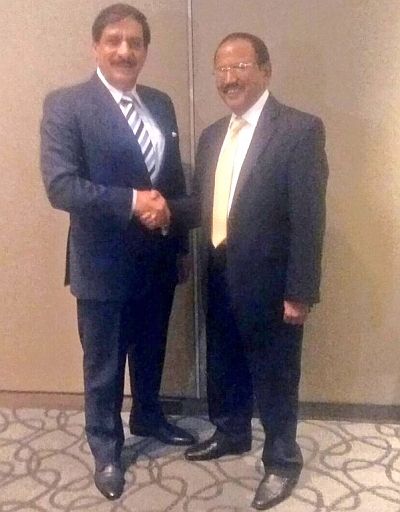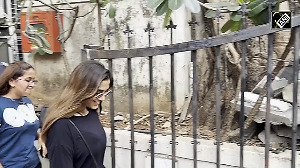'Modi's decision to hold out an olive branch to Sharif within 48 hours of the 'surgical strikes' has been a timely move as it helps tensions to 'de-escalate',' says Ambassador M K Bhadrakumar.

When I came to know on the evening of October 1 (Saturday) that according to the grapevine in Islamabad, a 'top aide' to Prime Minister Narendra Modi had contacted a 'key man' in the Pakistani capital the previous day (September 30, Friday) to convey to Prime Minister Nawaz Sharif that India did not want to further escalate the tensions, it did not come as surprise.
So, I posted a line on Facebook. The curious part was that no one doubted its veracity -- as if the expected had happened.
Now we know the Friday prayer turned out to be between National Security Advisor Ajit Doval and his Pakistani counterpart Lieutenant General Nasir Janjua (retd), as per Monday's disclosure by the advisor to Sharif on foreign affairs Sartaj Aziz.
Of course, the fog around the 'surgical strikes' of September 29 deepens. (Pamela Constable of the Washington Post probably reflected the assessment of the US security establishment in her story last weekend titled 'In Kashmir, doubts that Indian soldiers actually infiltrated across the border'.)
However, the 'surgical strikes' addressed the public outcry in India over the Uri attack, which, in turn, created the space for the government to engage with Pakistan.
Modi's decision to hold out an olive branch to Sharif within 48 hours of the so-called 'surgical strikes' across the Line of Control must have RSS backing. That is to say, Modi's famous speech at Kozhikode on September 24 was not a flash in the pan.
Modi realises that a re-engagement with Pakistan is an absolute pre-requisite for bringing about some modicum of 'normalcy' in Kashmir. This sound advice must have originated from President Pranab Mukherjee whom Modi met twice lately.
Pakistan is indeed in a position to aggravate or help ease the three-month-old crisis in the Kashmir valley. And it is in India's interest to preserve the 2003 ceasefire on the LoC even in its tattered form.
The 'big picture' would be that for Modi personally, it will be a political disaster if India becomes a national security State, which is almost inevitable if the 'surgical strikes' transformed as a 'new strategy' toward Pakistan, as many hardliners advocate.
For, that would entail mothballing the development agenda, or at least settling for an abridged version. Which would hold consequences in the 2019 poll.
The heart of the matter is that we have tied ourselves into a knot. A danger point has been reached in our demonising Pakistan and increasingly believing ourselves in all that crap.
Pakistan no doubt faces a host of problems -- like India too does -- but it is not about to collapse.
Pakistan suffers from a bad image internationally, but it is far too important a regional power to be 'isolated' by the world community.
Pakistan has had a bumpy ride with the United States lately, but that is because it took a conscious decision to strengthen its 'strategic autonomy.'
Pakistan faces difficulties as regards administering PoK and Gilgit-Baltistan, but there is no groundswell of opinion favouring India in those regions.
Pakistan has an urgent need to stabilise Baluchistan in view of the imperatives of the China-Pakistan Economic Corridor, but the situation is far from critical.
Pakistan has a political economy where the army enjoys institutional pre-eminence, but it is not as if the army can ride roughshod over others on matters of policy-making, being an institution that is rooted in the nation.
Pakistan may lack financial resources, but the military has not allowed the deterrent capabilities vis-a-vis India to get eroded.
Pakistan's military might have had a corporate interest in the past in fuelling tensions with India, but this is not necessarily the case anymore.
The bottom line is, Pakistan has a 'thinking' army leadership. The current leadership is completely sold out on the China-Pakistan Economic Corridor. The military's priority is internal security.
Its approach to the Afghan situation, therefore, is changing. The stabilisation of the southern regions of Afghanistan bordering Pakistan under a friendly regime in Kabul is the top priority.
Besides, China expects Pakistan to be a responsible player. Thus, Gulbuddin Hekmatyar's recent induction into Afghan politics underscores how despite President Ashraf Ghani's warm ties with Delhi, Pakistan does not want the national unity government in Kabul to collapse and has a congruence of interests with the US, China and Iran on this score.
Certainly, terrorism is the core issue. Pakistan is in denial mode, but then, it thinks India too is in denial mode.
Fundamentally, what is lacking is a transparent conversation regarding Pakistan's security concerns vis-a-vis India, which could conceivably lead to a moratorium on covert actions directed against each other.
We call it Pakistan-backed 'terrorism'; Pakistan calls it Indian 'subversive activities.'
Essentially, the sooner we pick up the threads from Sharm-el-Sheikh (where then prime ministers Manmohan Singh and Yousuf Raza Gilani tried to set the ball rolling), the better.
All in all, therefore, Modi's decision to hold out an olive branch to Sharif within 48 hours of the so-called 'surgical strikes' has been a timely move insofar as it helps tensions to 'de-escalate.'
The real challenge lies in making the overture into a constructive initiative. For that to happen, the guns must fall silent on the LoC first.











